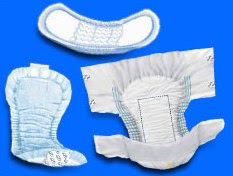Incontinence occurs in both Men and Women. Read the causes below.
Men
The most commonly experienced type of bladder weakness by men is a continuous dripping. This is often caused by a swollen prostate impeding the passage of the urine when urinating. As a result the bladder is not completely emptied.Men's bladders can become temporarily weakened after a prostate operation, although generally speaking things get back to normal after about a year.
Obesity can also lead to urine loss as it places undue strain on the abdominal and pelvic muscles.
Smoker's cough can also be an indirect cause of leaking as the coughing is frequent and often more violent. The greater risk of contracting the circulatory diseases that smoking causes and the subsequent prescription of diuretic medicines will also increase the risk of leaking.
Nerve damage, some medications, constipation or even an infection can also lead to bladder weakness.
The most common type of bladder weakness amongst men is overflow.
These are the different types of bladder problems that exist:
Overflow and drip
When your bladder does not empty completely urine builds up and in the end may begin to dribble out. An enlarged prostate can also impede the flow of urine leading to continuous dribbling.
Stress
Unexpected leaking when you laugh, cough, sneeze or do some kinds of physical training. Weakened pelvic floor muscles are the usual cause.
Urge
You experience a strong and sudden urge to pass urine. The bladder tries to empty despite your efforts to restrain leaking. There is a lack of co-ordination between impulses the brain gives to the bladder and what your bladder does.
Mixed symptoms
It is fairly common to have more than one type of symptom.
Protection
Stay clean and sanitary. Wear our Adult Diapers. You can order them online at www.binsons.com or from our customer service representatives at (888)-246-7667.
Women
Weakened pelvic floor musclesThe bladder and outlet passage are supported and held in place by a hammock of muscles called pelvic floor muscles that keep your bladder closed. If these muscles lose their strength and flexibility even everyday activities such as coughing may cause leaking.
Pelvic floor muscles can become stretched and weakened during childbirth. Being overweight can also put an added strain on them.
Menopause
All body muscles become weakened over time and after menopause, the reduction in the quantity of oestrogen also affects the abdominal muscles. As a result, the bladder shifts its position and the muscles around the urinary tract become less effective.
Other causes
Nerve damage, some medications, constipation or even an infection can also lead to bladder weakness.
These causes result in the folllowing four types of bladder problems:
Stress
Unexpected leaking when you laugh, cough, sneeze or do some kinds of physical training. Most often, weakened pelvic floor muscles or the menopause are the causes.
Urge
You experience a strong and sudden urge to pass urine. The bladder tries to empty despite your efforts to restrain leaking. There is a lack of co-ordination between impulses the brain gives to the bladder and what your bladder does.
Overflow and drip
When your bladder does not empty completely, urine builds up and in the end may begin to dribble out.
Mixed symptoms
It is fairly common to have more than one type of symptom.
Protection
Stay clean and sanitary. Wear our Adult Diapers. You can order them online at www.binsons.com or from our customer service representatives at (888)-246-7667.
Where can I learn more about Adult Diapers and how Binson's can help me?
Visit our Adult Diaper Page at http://www.binsons.com/cgi-bin/web/services/adult-diapers.html or contact one of our customer service representatives at (888)-246-7667.
This information is from
http://www.tena.us/consumers/bladder/women/ and http://www.tena.us/consumers/bladder/men/
To the best of our knowledge, the information contained herein is accurate. However, neither Binson's, or any of its subsidiaries assumes any liability whatsoever for the accuracy or completeness of the information contained herein. This information is for educational purposes only.



No comments:
Post a Comment